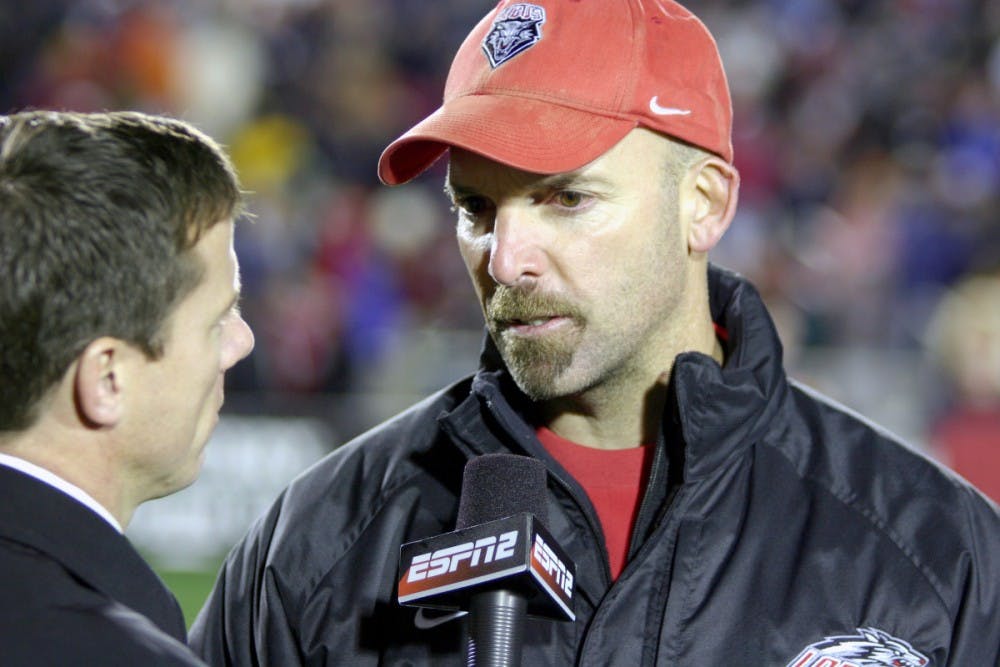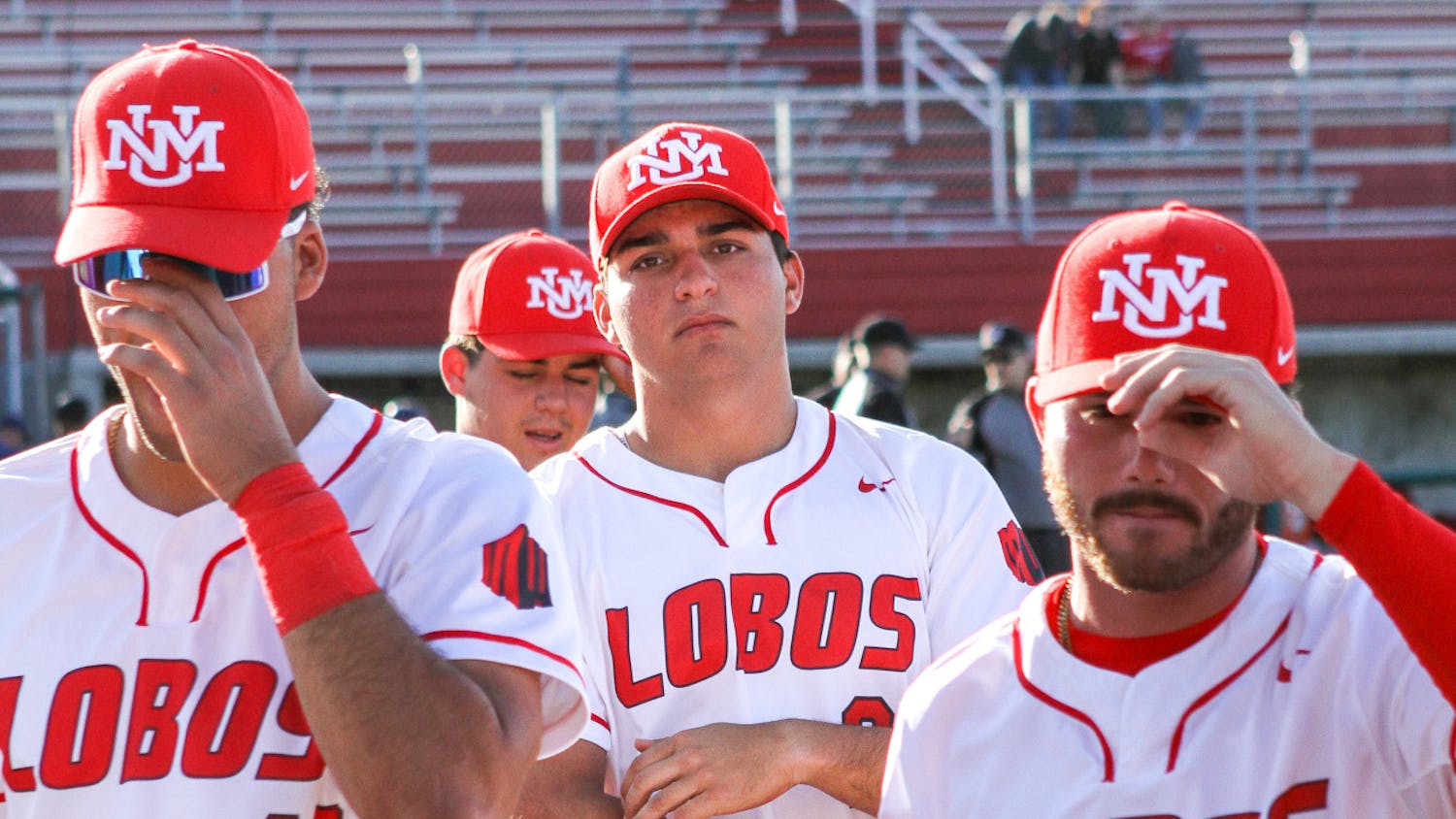assistantsports@dailylobo.com
@JROppenheim
Dave Robertson wasn’t on the first UNM men’s soccer roster when it gained NCAA status in 1983. He spent his first year of college on a soccer scholarship at San Diego State. But deep down, he didn’t feel like an Aztec.
“I’ll tell you, when I was at San Diego State, I remember going to see SDSU play the Lobos in basketball and thinking ‘Hell, I’m at SDSU but I want the Lobos to win,’” he said. “That was telling me something.”
While Dave was in California, his dad Craig Robertson was leading the UNM men’s soccer team in its first season of a program that would become one of the University’s most renowned sports program.
Thirty years later, UNM has established a résumé that gives every other Lobo team a run for its money: 342 wins, a .739 home winning percentage, seven conference regular-season championships since 2002, 10 NCAA tournament appearances, four Sweet 16 appearances and a national runner-up finish in 2005.
With solid fan support over the years — UNM has placed in the top 10 in attendance eight times — UNM begins its 30th season of NCAA competition this year today with a home game against Villanova, and current head coach Jeremy Fishbein said he’s excited to mark the occasion.
“The foundation was set long ago and there’s some great players, great coaches,” Fishbein said. “I’ve come on the back end of it and I’m just really thankful for the opportunity and keep getting better every day. That’s our goal.”
The first steps
Lobo men who wanted to take to the pitch had competed as a club team, but player support for Division I status grew in the early ‘80s and club coach Craig Robertson managed to convince UNM Athletics administration to make the squad a varsity program, Dave Robertson said.
The Lobos had a 10-3 overall record that season, capturing wins over teams such as Texas Tech, Colorado State, Arkansas and Weber State, while going undefeated in nonconference play.
Dave said UNM’s team at the time featured several players he played with in youth club soccer. Because some former teammates were being coached by his dad, the younger Robertson’s decision to head to New Mexico seemed like the obvious choice, he said.
Dave got to experience the birth of UNM Division I soccer on two fronts: from inside the household, and as a player.
According to Dave, Craig first became the coach of UNM club team in 1981 after being approached by some players to take the position. From there, Craig started his pursuit to build the team as an NCAA program.
Get content from The Daily Lobo delivered to your inbox
That took some convincing. To support the program, Dave said, Craig approached then-athletic director John Bridgers and said the team could fund itself through Lobo youth soccer camps. The University provided a field, athletic trainers and facilities, Dave said, but all other funding came from those camps, which still exist today.
The team found success early. Initially, UNM played in the Rocky Mountain Intercollegiate Soccer League, finishing as high as third place.
With a team made up of many native New Mexicans and some international players, the Lobos won 31 games in three Division I seasons under Craig before he died.
According to a Daily Lobo story from March 14, 1986 that cites UNMPD, the coach died from an apparent suicide. He was also a professor of chemical and nuclear engineering at UNM. A prepared statement from then-UNM President Tom Farer said Craig “represented a remarkable combination of athlete and scholar.”
“Without benefit of a single scholarship, he made UNM into a contending team,” Farer said in the statement.
Craig’s winning percentage, .707, is the second-best among the four coaches in team history. The UNM practice field located south of the soccer stadium is named after him.
Dave also planted his name in team lore. His jersey number, No. 8, is the only one to be retired. Until 1994, he was UNM’s all-time leading scorer with 30 goals and 88 points. He still ranks fourth in team history in both categories.
A rough skid
After Craig Robertson’s death, Klaus Weber took the job as Lobo head coach, leading the Lobos to a 12-6-1 record his first season and earning the RMISL Coach of the Year award. It was the first such recognition for the Lobos.
UNM held a memorial tournament in its former coach’s honor and captured emotionally charged wins over UNLV and Cal State Fullerson, Dave Robertson said.
“I have great respect for how Klaus handled that year,” he said.
Weber is the longest-tenured coach in team history, serving that top position from 1986-87 and again from 1989-2001. He had 152 coaching wins and a .542 winning percentage at UNM. In addition to his 1986 coaching award, he received the Mountain Pacific Sports Federation (MPSF) honor in 1997.
Jim Wiesen coached the team for one season, 1988, when the Lobos had a 5-13-1 record.
Although UNM had a solid record in Weber’s first year, the Lobos hit a skid with three losing seasons from 1987-89. However, the team began a resurgence in the early ‘90s.
By the time Jason Hix entered the program in 1992, the team had begun to make a name for itself regionally. The Lobos left the RMISL in 1988 and joined the MPSF in 1992, competing against strong, nationally recognized foes such as UCLA, Stanford, Washington and Fresno State.
UNM was not initially the target destination for Hix, whose 20 assists ranks fourth on the team’s all-time list, because he “couldn’t score a goal.” He said he wrestled with the decision to accept a scholarship offer to play soccer for Dartmouth or an appointment to the Air Force Academy, which also had a strong soccer program at the time.
A “nasty” ankle injury during his senior season at Sandia High School changed those plans, he said. Dartmouth pulled back its offer because, as Hix was told, “We can’t spend our money on a question mark.” The injury also left Hix medically ineligible to be an Air Force cadet, he said.
While at the hospital, Weber visited Hix.
“He actually came to the hospital and said ‘If you can look me in the eye and, after all the surgeries and all the rehab, give it a college try in terms of coming back, I’ll pay for everything academics doesn’t,’” Hix said. “I’ll be forever indebted to him. He gave me an opportunity that other coaches simply wouldn’t.”
Though not a goal scorer, Hix played alongside players who could find the back of the net, including Michael Strati, who had 44 goals from 1992-94. Strati had 13 goals in 1992 and another 15 in 1994. Another top scorer in those days was Edmundo Rodriguez, who netted 19 goals in 1992.
The team cracked the national rankings for the first time in 1992 coming in at No. 20. Two highlights from the 1992 season came when the Lobos captured a 2-0 win over No. 2 UCLA and a 2-0 win over No. 18 Illinois State. Prior to those wins, UNM had just one win in four tries against ranked foes.
In 1994, Justin Sells joined the squad. He said he kept up with several teams, including UNM, and saw the Lobos as an up-and-coming program that he could contribute to right away. UNM also broke into the top 10 for the first time that season after capturing a 1-0 double-overtime win over then-No. 1 Indiana.
The team had at least 11 wins in ’94, ’96 and ’97. For his career, Sells scored 57 goals on 322 shots, and still ranks No. 1 all-time in both categories. He also has three of the 10 best single-season scoring efforts with 13 goals in 1994, 16 goals in 1996 and another 16 in 1997.
“Yeah, it’s been a while. That record’s held up,” Sells said. “Maybe someday it will get broken. That’s what records are for, for people to try to break them and perform at a certain level.”
New heights
Weber retired after 15 years with UNM and was replaced by Coach Jeremy Fishbein who has taken the program to unprecedented heights.
Since taking over in 2002, Fishbein has totaled more wins than the previous three coaches (154) and has the best winning percentage (.732). He’s received coaching awards eight times, and in 2004 the Lobos were ranked No. 1 in the nation for the first time.
Jeff Rowland tied Rodriguez’s single-season goal record of 19 in 2004.
The next season featured UNM’s trip to the NCAA College Cup championship game. Considering the success UNM had in 2004, Fishbein said it came as no surprise that the team was poised for something special the following season.
The Lobos won 15 of their 18 regular-season games, opening the campaign with wins over No. 23 Penn State and No. 18 Ohio State. UNM did not suffer a loss in its last six games.
After a shutout victory over Wisconsin-Milwaukee in the NCAA tournament’s second round, the Lobos advanced to the finals after getting wins over Cal State-Northridge, California and Clemson. In a battle between the top-two ranked teams in Cary, N.C., Maryland defeated UNM for the title by a 1-0 decision.
UNM’s first three wins before the semifinals all came in overtime.
“There’s always an element of luck to keep going with a single-elimination tournament, but we positioned ourselves well and were playing at home right up until the Final Four,” Fishbein said. “We knew we were going to be good but you never know just with injuries and stuff how it would play out. Things just went really well with that team.”
With the team success from 2005, Rowland ended his career at No. 2 in all-time goals with 45. He scored 16 that season, matching Sells’ two highest seasons.
Though UNM has not been back to the finals since then, the team has had no fewer than nine wins each season, capturing 18 in 2011 and 17 in 2012. The Lobos have missed the NCAA tournament just one time over that stretch as well.
“I don’t think there’s any better program in the country,” said Michael Kafari, a senior midfielder on this year’s squad. “With my experiences, looking at other teams’ facilities or coaching staffs, here’s the place. If you want to get better, this is the place you come to. They’re going to push you and you’re going to get better.”
With Fishbein at the helm and the direction the team is headed, Hix said the program is in good hands.
“They really have an awful good group of kids that have gone through there, both in terms of the soccer piece as well as being involved in the community,” he said. “They’re producing good people and guys you’d like to have in your community. I’m a big fan.”






